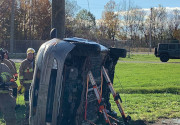| |
| |
 |
 |
| |
 |
|
@{mv_date_MMM d, yyyy}@ |
|
| |
There are approximately 6,000 volunteer firefighters in Nova Scotia and recruitment has been a longstanding challenge in many rural communities. The Antigonish County Volunteer Fire Department is taking proactive steps to ensure the well of new volunteers never goes dry.
» Read more
A firefighter suffered injuries requiring hospitalization battling an intensely hot and stubborn fire that broke out in a home in west Toronto overnight Monday.
» Learn more
Ontario’s fire marshal is leading the investigation into a Monday morning house fire left that one person dead.
» Read more
Fire has destroyed part of an Indigenous owned and operated lodge in the southern Interior but the Little Shuswap Lake Band says it is planning to rebuild.
» Read more
|
| |
 |
 |
| |
|
| |

Ventilation can make or break the outcome of a fire. Ensuring its success requires a knowledge of how it works and what precautions must be taken.
Coordinating Ventilation: Supporting Extinguishment and Survivability examines ventilation and its relationship to fire behavior to identify how it affects the fire, operations, and—most importantly—victim survivability. Ventilation can be universally applied, from the smallest rural community to the largest metropolitan city.
Now available at Firehall Bookstore.
» Order your copy today |
| |
|
| |
 There is a story inspired by the U.S. hockey team at the 1980 winter Olympics that stands out above many others. Regardless of what nation you belong to, this story and its outcome will always be remembered as the miracle on ice. Let’s start near the beginning, with Herb Brooks, sitting at home on the sofa with his father, watching his hockey team win an Olympic gold medal. The year is 1960 and after making the previous two Olympic teams, a young and deflated Brooks was the last cut for this year’s team. Ever since that moment, Brooks was determined to move from player to coach, eventually coaching a U.S. hockey team. By James R. Rychard
» Learn more
There is a story inspired by the U.S. hockey team at the 1980 winter Olympics that stands out above many others. Regardless of what nation you belong to, this story and its outcome will always be remembered as the miracle on ice. Let’s start near the beginning, with Herb Brooks, sitting at home on the sofa with his father, watching his hockey team win an Olympic gold medal. The year is 1960 and after making the previous two Olympic teams, a young and deflated Brooks was the last cut for this year’s team. Ever since that moment, Brooks was determined to move from player to coach, eventually coaching a U.S. hockey team. By James R. Rychard
» Learn more |
| |
 When thinking about our compliment of auto ex tools and how we evaluate our needs, the one area that is often overlooked or undervalued is the stabilizing and/or lifting struts. While some may argue this is due to their somewhat limited use on our general extrication calls, with the advent of newer struts on the market, today’s strut combinations put that argument to bed very quickly. From their original inception in the rescue world, these tools were used mainly for general stabilization and widening of the vehicle footprint (for more, see the October 2021 Extrication Tips). But now, struts, like many other tools in our trade, have been evaluated, re-engineered and rebranded to make them extremely versatile and valuable to any department, no matter the size or budget. The tricky part is knowing which one or type to go with. By Chad Roberts
» Learn more
When thinking about our compliment of auto ex tools and how we evaluate our needs, the one area that is often overlooked or undervalued is the stabilizing and/or lifting struts. While some may argue this is due to their somewhat limited use on our general extrication calls, with the advent of newer struts on the market, today’s strut combinations put that argument to bed very quickly. From their original inception in the rescue world, these tools were used mainly for general stabilization and widening of the vehicle footprint (for more, see the October 2021 Extrication Tips). But now, struts, like many other tools in our trade, have been evaluated, re-engineered and rebranded to make them extremely versatile and valuable to any department, no matter the size or budget. The tricky part is knowing which one or type to go with. By Chad Roberts
» Learn more |
| |
|
| |
Firefighter survival tactics are evasive, and should be considered risky when employing them. They are reserved for last ditch efforts when facing a life and death situation. A firefighter who is trapped with flashover impending or already occurred needs to escape the situation and environment as quickly as possible — by any means necessary. In this Back to Basics, we’re going to look at a very risky and injury prone escape technique called ‘the hang and drop’. By Mark van der Feyst
» Read more
|
|
Let’s pause and chat a wee bit about self-care, shall we? Think back to the last time you boarded an airplane. What was the safety presentation’s number one guidance with respect to the use of oxygen masks? Apply your mask first before assisting others. This is the meaning behind the statement, “you cannot pour from an empty cup.” Fill your “cup” with energy, physical health, positive affirmations and strong mental resilience before you set out to help others. By Julia Long
» Read more
| | |
| FIRE FIGHTING IN CANADA: THE PODCAST |
|
|
| |
|
Tune in to April’s podcast for a conversation on how public alerts have evolved, why radio is still a key player, what the research shows about public reaction to emergency notifications, best practices for crafting your message, why it’s important to know and address your policy hurdles and how GPS plays a role in the next generation of population targeting. Podcast host Fire Chief Tom DeSorcy talks all this and more with Jacob Westfall, chief technology officer with Public Emergency Alerting Services Incorporated (PEASI), a mass notification software company based in Calgary who is the developer of Alertable software.
» Listen now |
| |
|
| |
|
|
| |
| |







